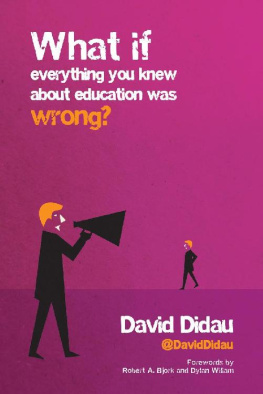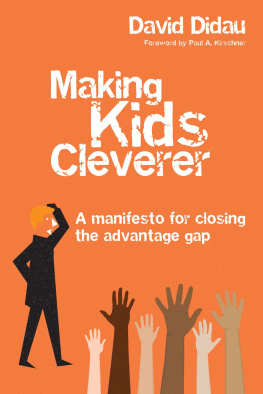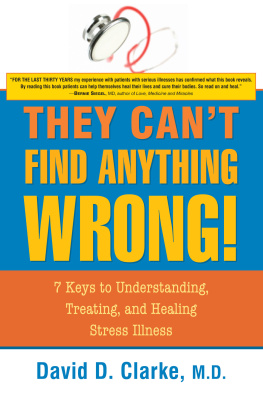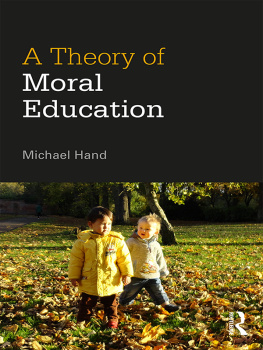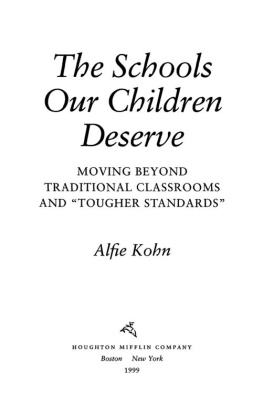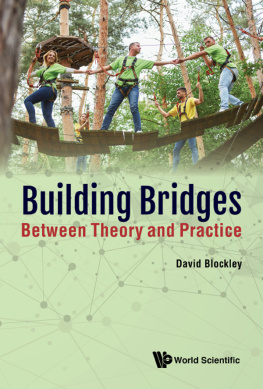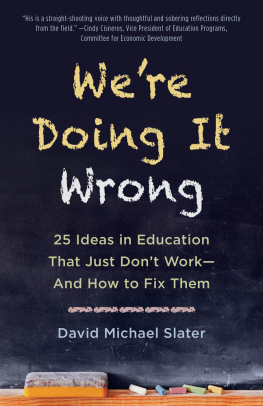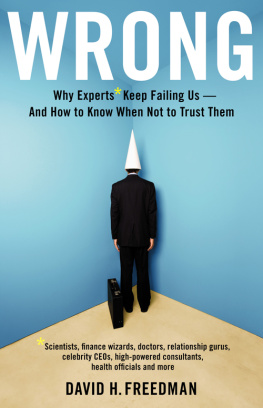Robert A. Bjork
Using various versions of the title, How We Learn versus How We Think We Learn, I have given talks to different audiences on the surprising discrepancy that exists between what research has revealed about how humans learn and remember versus how people tend to think they learn and remember. The discrepancy is surprising because one might expect that as lifelong users of our memories and learning capabilities, coupled with the trials and errors of everyday living and learning, we would have come to understand how to optimise not only our own learning, but also the learning of those we are responsible for teaching, whether at home, in schools or in the workplace. The discrepancy is important, too, because as David Didau documents and illustrates so well in this book, optimising the effectiveness of our teaching and our own learning depends on incorporating methods and activities that mesh with how we actually learn versus how we think we learn.
That we tend to have a faulty mental model of how we learn and remember has been a source of continuing fascination to me. Why are we misled? I have speculated that one factor is that the functional architecture of how we learn, remember and forget is unlike the corresponding processes in man-made devices. in our memories that they will write themselves on our brains which could not be further from the truth.
Also, to the extent that we think of ourselves as some kind of recording device, we are unlikely to realise how using our memories shapes our memories. That is, we can fail to appreciate the extent to which retrieving information from our memories increases subsequent access to that information and reduces access to competing information. Retrieving information from a compact disc or computer memory leaves that information and related information unchanged, but that is far from the case with respect to human memory. More globally, to the extent that we think of ourselves as recording devices, we may fail to appreciate the volatility that characterises access to information from our memories as conditions change, events intervene and new learning happens. Information that is readily accessible in one context at one point in time may be completely inaccessible at another point in time in a different context and vice versa.
We can also be led astray by oversimplifying what it means to have stronger or weaker memories. We may think, for example, that memory traces in our brains are like footprints in the sand that can be shallower or deeper and, hence, more or less resistant to the effects of forgetting. In fact, how memories are represented in our brains is multidimensional: some memory A, for example, may appear stronger than some other memory B by one measure, such as recognition or the subjective sense of familiarity, whereas memory B may appear stronger by some other measure, such as free or cued recall. Basically, by intuition or experience alone, we can never come to realise the amazing array of interactions of encoding conditions and test conditions that have been shown in controlled experiments to affect our ability to retain and recall to-be-learned information. We may have a general idea, even an accurate idea, that some learning activities produce better retention than others, but appreciating fully the complex interactions of encoding conditions, retention interval, type of later test and what cues will or will not be available at the time of the final test requires a whole different level of understanding.
To make things even more challenging for us as learners and/or teachers, conditions of instruction or practice that appear to result in rapid progress and learning can fail to produce good long-term retention of skills and knowledge, or transfer of such skills or knowledge to new include spacing, rather than massing, repeated study opportunities; interleaving, rather than blocking, instruction or practice on the separate components of a given task; providing intermittent, rather than continuous, feedback to learners; varying the conditions of learning, rather than keeping them constant and predictable; and using tests, rather than re-presentations, as learning opportunities.
The key point one that David Didau emphasises and one that readers of this book should be sure to take away is that there is a critical distinction in research on learning, one that dates back decades: namely, the distinction between learning and performance. What we can observe and measure during instruction is performance; whereas learning, as reflected by the long-term retention and transfer of skills and knowledge, must be inferred, and, importantly, current performance can be a highly unreliable guide to whether learning has happened. In short, we are at risk of being fooled by current performance, which can lead us, as teachers or instructors, to choose less effective conditions of learning over more effective conditions, and can lead us, as learners ourselves, to prefer poorer conditions of instruction over better conditions of instruction.
Several aspects of this book make it especially valuable. One is that David Didau has not only explained and illustrated the research findings to which I have alluded, as well as other key findings from social psychology and cognitive psychology, but he has also done so in terms of their relevance to real world schools and education. He has also discussed such findings and their implications with respect to historical trends and ideas that have guided, and sometimes misled, educational practices. Finally, and critically, he is able to discuss research findings and their implications for real world teaching from the standpoint of somebody who has been in the trenches, as it were. His career as a teacher and as an administrator in pre-college settings provides a perspective that is lacked by those of us who have spent our careers doing research and teaching in the ivory tower.
Notes
Robert A. Bjork, Assessing Our Own Competence: Heuristics and Illusions, in D. Gopher and A. Koriat (eds), Attention and Performance XVII. Cognitive Regulation of Performance: Interaction of Theory and Application (Cambridge, MA: MIT Press, 1999), pp. 435459.
Robert A. Bjork, On the Symbiosis of Learning, Remembering, and Forgetting, in A. S. Benjamin (ed.), Successful Remembering and Successful Forgetting: A Festschrift in Honor of Robert A. Bjork (London: Psychology Press, 2011), pp. 122.
Robert A. Bjork, Memory and Metamemory Considerations in the Training of Human Beings, in J. Metcalfe and A. Shimamura (eds), Metacognition: Knowing About Knowing (Cambridge, MA: MIT Press, 1994), pp. 185205.
Foreword by
Dylan Wiliam
Education has always had a rather uneasy relationship with psychology. As Ellen Condliffe Lagemann describes in her account of the troubling history of education research, for many years, it was thought that psychology could provide a disciplinary foundation for the practice of education. Indeed, for a while, many of those engaged in teacher education behaved as if education was really just applied psychology. Psychologists would determine the optimal conditions for learning, and teachers would then create those conditions in their classrooms. As a result, in the 1960s and 1970s, courses on the psychology of learning featured prominently in most, if not all, pre-service teacher education programmes.

